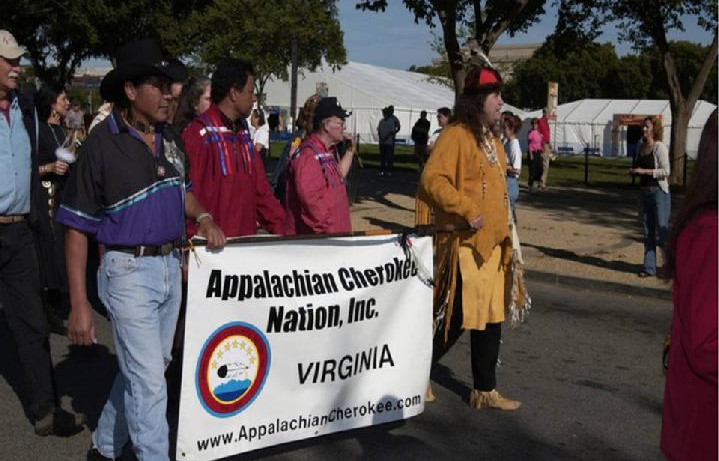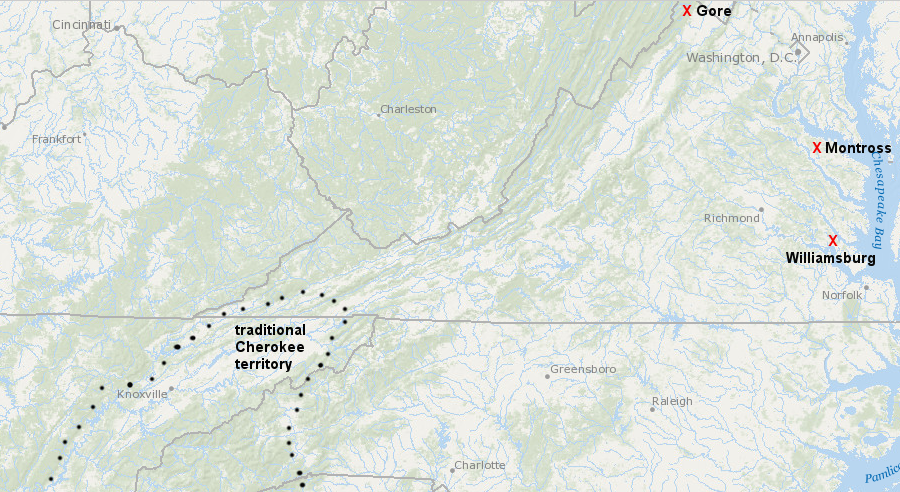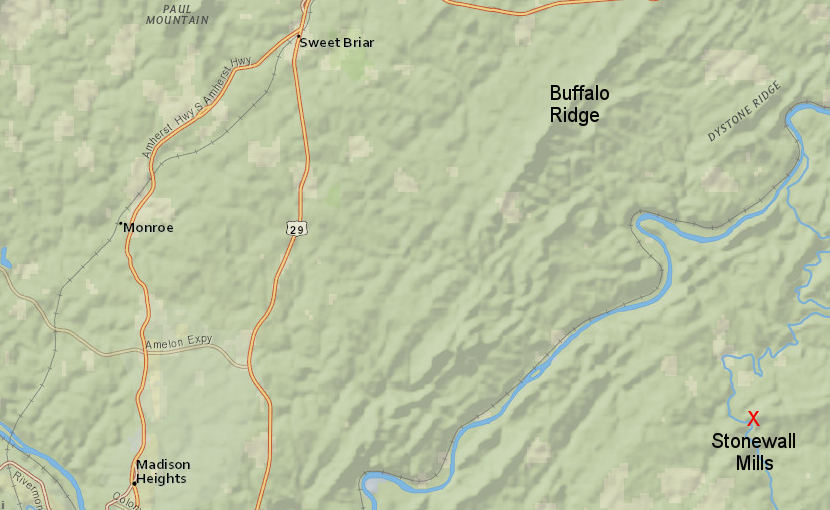The Quest of the Appalachian Cherokee Nation for State Recognition

the Appalachian Cherokee Nation marched in 2004 at the opening of the National Museum of the American Indian in Washington, DC, but the three Federally-recognized Cherokee tribes oppose giving it official recognition
Source: Appalachian Cherokee Nation, PowWow Photos
In 2010 the Virginia General Assembly passed a law granting state recognition to the Cheroenhaka (Nottoway), Nottoway of Virginia, and Patawomeck tribes, ignoring the recommendations of the Virginia Council on Indians. In response, the members of that council stopped meeting, and the state legislature formally abolished it in 2012.
Ending the council's administrative review process placed all responsibility for tribal recognition on the General Assembly. Since 2010, however, no group claiming a Native American heritage has been able to get a law passed by the legislature.
The Virginia General Assembly has postponed action on the Appalachian Cherokee Nation's request for state recognition since it first sought recognition in 2012. That group was based at Montross in Westmoreland County then, but in 2015 it closed the Cultural Center in Montross and announced plans to move to Williamsburg.
When advertising plans for a community meeting at the James City County Library, the group said:1
- The Tribe selected Williamsburg, Va. as their interim meeting place, due to the historic aspects of the city and the Tribe's continuing research into its own history.
Williamsburg was, like Montross, in Tidewater Virginia. That territory was controlled by Algonquian-speaking tribes in 1607, and was far from the areas traditionally occupied by Iroqu0ian-speaking Cherokee in the Tennessee River watershed. By 2016, the Appalachian Cherokee Nation had moved again and advertised an address in Gore, in Frederick County near Winchester.2
The Cherokee may have traveled through Gore on the way to attack the Iroquois in the 1600's and 1700's, but northwestern Virginia was never occupied by Cherokee. In colonial times, the Cherokee were an Iroquoian-speaking tribe based in the Tennessee River watershed, including southwestern Virginia. In 1838, much of that tribe was forced to relocate to Oklahoma, following a "Trail of Tears." The Eastern Band of Cherokee Indians avoided expulsion, and today are a Federally-recognized tribe with a reservation near Great Smoky Mountains National Park.

the shifting locations of the Appalachian Cherokee Nation are outside the area traditionally occupied by the Cherokee
Source: ESRI, ArcGIS Online
In 2013, bills to consider recognition of the Appalachian Cherokee Nation and the United Cherokee Indian Tribe of Virginia (Buffalo Ridge Band of Cherokee) were introduced in the Virginia General Assembly.
Opposition to recognition came from the three Federally-recognized Cherokee tribes, the Cherokee Nation, Eastern Band of Cherokee Indians and United Keetoowah Band of Cherokee Indians. They had created the Cherokee Identity Protection Committee in 2011, which identified 200 groups that claimed to be affiliated with Cherokee heritage and might seek some form of recognition. A member of the Cherokee Identity Protection Committee wrote:3
- I am a citizen of a nation, and not a member of a club. The identity and cultural theft of our people continues with groups such as these trying to make governments out of affinity groups.
The widow of the former chief of the Appalachian Cherokee Nation expressed her opposition to state recognition of the Appalachian Cherokee Nation:4
- I just found out that the Appalachian Cherokee Nation or Appalachian Nation Cherokee will try for state approval. This is not a real tribe. It's more like a club. I should know. I'm the widow of Chief Raymond Lonewolf Couch. Ray believed that if a person had just one drop of Cherokee blood, he or she was Cherokee. Ninety-eight percent cannot prove blood.
The Cherokee Identity Protection Committee also made clear it would oppose any effort of the United Cherokee Indian Tribe of Virginia to be recognized as a "government" of some sort. That group has more-generic requirements for membership than just Cherokee heritage:5
- Membership is open to descendants of the original Native Americans who lived in the tribal setting on Buffalo Ridge (Amherst County) and/or "Stonewall Mill" area (Appomattox County) in the 1700s and early 1800s

the United Cherokee Indian Tribe of Virginia welcomes descendants of Native Americans who lived in an area traditionally considered to be the home of the Siouan-speaking Monacan tribe
Source: ESRI, ArcGIS Online
The General Assembly in 2016 directed the Secretary of the Commonwealth to create what is now the Virginia Indian Advisory Board on State Recognition. That state organization has the responsibility of receiving applications for state recognition of a Native American tribe and making a recommendation to the General Assembly. The Appalachian Cherokee Nation never filed an application for recognition.
In 2019, a different group claiming association with the Cherokee petitioned for state recognition. The Wolf Creek Cherokee Tribe filed a Statement of Intent with the Virginia Indian Advisory Board. The Wolf Creek Cherokee Tribe was based in Henrico County, but named after places in Giles County which were far closer to the area of Cherokee settlement in the 1600's and 1700's.6
Links
References
1. "Appalachian Cherokee tribe moving office from Montross to Williamsburg," Westmoreland News, May 28, 2015, http://www.westmorelandnews.net/appalachian-cherokee-tribe-moving-office-from-montross-to-williamsburg/; "Appalachian Cherokee Nation Tribe," The Virginia Gazette< May 21, 2015, http://www.vagazette.com/news/community/vg-ugc-article-appalachian-cherokee-nation-tribe-2015-05-22-story.html (last checked September 25, 2016)
2. "Contact Us," Appalachian Cherokee Nation, http://www.appalachiancherokeenation.net/contactus.html (last checked September 25, 2016)
3. "Two groups claiming Cherokee heritage seeking recognition in Virginia," Cherokee One Feather, February 28, 2013, https://theonefeather.com/2013/02/two-groups-claiming-cherokee-heritage-seeking-recognition-in-virginia/ (last checked September 25, 2016)
4. "No celebrity in tow, Va. Cherokee tribe is told to wait", The Virginian-Pilot, March 4, 2014, http://www.freelancestar.com/2013-02-08/articles/593/letter-appalachian-cherokees-a-club-not-a-tribe/ (last checked September 25, 2016)
5. "Membership," United Cherokee Indian Tribe of Virginia, http://www.ucitova.org/membership.html (last checked September 25, 2016)
6. "Resolution of the Tribal Council of the Wolf Creek Cherokee Tribe," September 30, 2019, https://www.commonwealth.virginia.gov/media/governorvirginiagov/secretary-of-the-commonwealth/indian-advisory-board/pdf/Wolf-Creek-Cherokee-Tribe---Letter-of-Intent.pdf; "Meet the group that wants to be the first Cherokee tribe recognized by Virginia," Virginia Mercury, November 18, 2019, https://virginiamercury.com/2019/11/28/meet-the-native-american-tribe-that-wants-to-be-the-first-cherokee-group-recognized-by-virginia/ (last checked October 26, 2025)
"Indians" of Virginia - The Real First Families of Virginia
Virginia Places


